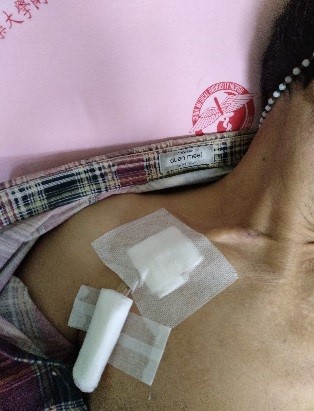Self-care precautions
- Don't sleep on one’s side to avoid compressing the catheter.
- The exposed part of the catheter should be fixed firmly. If there is any swing of the catheter, it should be fixed again.
- The clamp and rubber plug of the catheter should be kept closed. Do not adjust the switch by yourself. If it becomes loose, it may cause infection or bleeding. Nurses should be informed to deal with it.
- Avoid crowded public places where catheters are easily tugged and displaced.
- Do not administer medication or draw blood via a catheter to prevent infection or obstruction unless it is urgently needed and approved by the physician.
Self-care
Catheter placed in the neck
- The area below chest can be washed with water while taking a bath. Avoid getting the wound wet and cause infection.
- Wear a loose-fitting top with front buttons, instead of pull-over ones. Do not pull the catheter.
- Wash your hair with supine position, during which cover the wound with plastic cloth to avoid dampening the wound dressing and causing inflammation and infection.
Catheter placed in the thigh and groin
- Minimize excessive bending of the thigh and off-bed activities. Avoid catheter bending and venous return, which will result in catheter obstruction.
- Rub yourself down with a wet towel. Keep your dressing dry to avoid infection.
- Please wear loose-fitting pants and underpants to avoid tugging and shifting of the catheter when changing clothes.
- Keep the perineum clean and avoid getting the wound wet when urinating or defecating. If necessary, please go to the dialysis room for dressing change.
For any of the following situations after discharge, please seek treatment immediately
- There is erythema, swelling, heat, and pain around the exit site of the catheter.
- The stitches of the catheter come loose or fall off from the wound.
- When the rubber plug at the end of the catheter comes loose, it may cause bleeding or infection. Seek immediate treatment at the hospital.
- If blood oozes from the wound or the catheter slips out accidentally, compress the wound with gauze immediately and come to the hospital for treatment as soon as possible.
- Avoid any sharp objects such as scissors or safety pins near the catheter.


